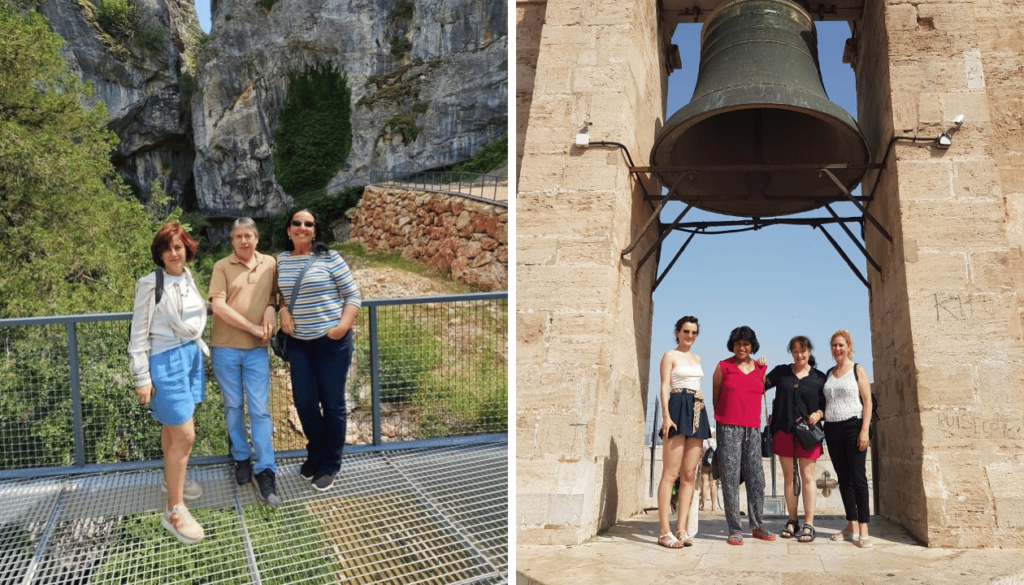

Let’s face it, conducting business abroad can sometimes feel like walking into a room where everyone’s in on a joke… except you. And if that room happens to be in Spain or Latin America, there’s a high chance someone will offer you coffee, comment on your tie, and ask about your family before anyone even mentions the project you flew in for.
Generally speaking, Spanish business culture values personal relationships and informal conversation before getting down to business, though there are always regional and individual differences.
So, how do you decode business etiquette in Spain and other Spanish-speaking countries without fumbling every social cue?

The trick lies in balancing professional poise with warm personal relationships, a firm handshake with soft small talk, and yes, knowing that croquetas de jamón might just get you further than your PowerPoint.
Spain’s economy, with its strong tourism, manufacturing, and agriculture sectors, shapes the way business is conducted and makes understanding local etiquette essential for success.
In this guide, we’ll walk you through the unwritten rules of Spanish business culture, the do’s, the don’ts, and everything in between.

1. Greetings and First Impressions
In Spanish business culture, greetings matter a lot. A firm handshake, direct eye contact, and a warm smile are your basic starter pack. Add in a friendly “Encantado/a” and you’re off to a good start.
But here’s the twist: don’t be surprised if Spanish people lean in for a cheek kiss after a few meetings, especially if things have gone well. It’s not unusual. And no, it doesn’t mean your proposal is getting approved, it’s just how people connect.
Spanish professionals often value establishing a personal connection before business even begins. So, if your meeting starts with ten minutes of small talk about the weather, football, or your last holiday, that’s normal. Don’t rush it.
In more formal business settings, titles matter—Señor, Doctora, and so on. Use them until invited, otherwise. And always dress smart, as your appearance is seen as a reflection of your professional achievement. Business attire in Spain leans classic and sharp; wear lightweight suits for the summer, and nothing too flashy, unless you’re in fashion. Then, all bets are off.

2. Building Personal Relationships
Here’s a truth universally acknowledged in Spanish business culture: business is personal. You’re not just selling a service, you’re showing up as a whole person. And in many Spanish regions, trust comes from knowing who you are beyond your job title.
That’s why building a personal relationship is essential before engaging in business negotiations. Personal relationships often come before contracts. It’s common for business meetings to start with chats about family, food, or football. Don’t skip this part, it’s not fluff. It’s the foundation of lasting business relationships in Spain’s business landscape.
In some major cities, the pace might be faster, but the heart remains the same. You’re expected to speak Spanish when possible, and showing effort, even with mistakes, earns you major respect. It tells your Spanish counterparts that you care enough to engage with their local culture.
Keep in mind that building rapport takes time. Forget the hard sell. If your goal is a successful negotiation, get ready for multiple coffees and more than a few jokes. Humor, when used well, is often part of the dance.
And yes, people do remember how you took your café con leche last time. So don’t act surprised when your business host brings it without asking.

3. Communication Styles and Body Language
If you’re used to blunt emails and straight-to-the-point meetings, the Spanish business world might catch you off guard. Spanish people tend to communicate with warmth, flair, and a bit of drama, especially in person.
In business settings, spoken words matter, but so does body language. Expect expressive gestures, animated storytelling, and the occasional interruption. This doesn’t mean they’re being rude. On the contrary, it shows interest. Silence, on the other hand, can feel awkward, so fill the gaps with friendly comments or small talk.
Direct confrontation is often avoided. So, if someone disagrees with you, they may soften it with polite phrasing or indirect hints. Learning to read between the lines is key to navigating the Spanish business environment.

Also, don’t be surprised if people stand closer than you’re used to. Physical contact, like a touch on the elbow or shoulder, isn’t unusual. It’s a cultural norm that signals familiarity, not discomfort. Backing away too much might even seem cold.
In more traditional or senior manager settings, keeping a respectful tone is important, but that doesn’t mean you have to be stiff. Confidence mixed with humility goes a long way.

4. Meetings, Agendas & Business Appointments
Business appointments in Spain aren’t always governed by rigid timekeeping, but showing up late to a business meeting isn’t exactly charming either. Aim to be punctual even if your Spanish colleagues are fashionably five minutes behind. It’s polite, and it sets the tone for proper business meeting etiquette.
Agendas may exist, but they’re often seen as suggestions rather than commandments. Flexibility is the name of the game in many Spanish companies, especially outside the most formal sectors. So don’t panic if conversations flow freely and points get revisited three times.

You’ll also notice that decisions often take longer than expected. This is where patience becomes a strength. Building consensus is part of the process, especially when senior management is involved. Rushing it? That might be considered a bit too eager.
And a quick note, if you’re used to back-to-back Zoom calls, many Spanish professionals still prefer in-person interaction. It’s not just about discussing facts; it’s about reading faces, voices, and vibes. That’s something you get better at by spending real time with locals. However, online networking is becoming increasingly important in Spain, serving as a modern alternative or complement to traditional business card exchanges.
✨ Pro tip: If you’re studying business Spanish in Burgos or Valencia through a homestay experience, these subtle details—timing, tone, tempo—start to feel intuitive.

5. Dress Code and Personal Presentation
In Spain, how you show up matters, and we’re not just talking about attitude. Your outfit does a lot of the talking, too. In most business settings, the unspoken rule is to look sharp without screaming for attention.
Spanish people tend to dress with style and intention, even in more relaxed environments. They are quality conscious and appreciate attention to detail, often favoring accessories or gifts from a reputable brand. Think tailored blazers, polished shoes, and yes, even in the summer months, some brave souls stick to lightweight suits. It’s not just about fashion, it’s a reflection of respect.
For women, there’s room for creativity, but it’s balanced with elegance. Flashy logos or anything too revealing might feel out of place in traditional settings. Personal presentation is seen as a sign of professionalism, and being well put-together can say more than your business card. When giving gifts or choosing business accessories, it’s important to offer only high quality items to ensure they are well-received.
That said, there’s a range depending on Spanish regions. What flies in Barcelona or Valencia may differ slightly from the expectations in Burgos or Cádiz. Observing local styles helps you blend in while still being yourself.

6. Meals, Socializing & Business Lunches
In Spain, the phrase “Let’s do lunch” isn’t just a polite suggestion. It’s often where business relationships really begin to take shape. Business meals play a key role in fostering professional relationships, focusing on building trust and rapport rather than direct negotiations. Forget awkward elevator pitches, business lunches are long, lively, and full of personality.
Don’t expect to jump straight into numbers while the croquetas de jamón are still warm. Spanish culture puts a lot of value on personal connections, so this is your chance to share a bit of yourself. Chat about travel, food, or the local culture. Football is always a safe bet. Politics… less so.

Meals are rarely rushed. Courses come one after another, and dessert isn’t optional—it’s cultural. After the meal, it’s customary to enjoy sobremesa, an extended conversation at the table. Rushing or skipping sobremesa after a business meal is considered rude in Spanish culture, as it shows impatience and a lack of respect for social etiquette. Business etiquette in Spain says the bill is usually handled by the one who invited (or the business host), and tips, while appreciated, are not expected.
And yes, wine at lunch is normal. Just keep it moderate. You’re here to build trust, not to nap afterwards.
✨ If you’ve ever had a business lunch in Cádiz during a SHIP stay, you’ll know exactly how to pace yourself: with confidence, curiosity, and maybe a second helping of seafood.
7. Hierarchy, Decision-Making & Negotiations
Let’s talk structure. While Spanish business culture can feel relaxed on the surface, the chain of command still matters, especially when it comes to business negotiations and decision-making.
In many Spanish companies, final calls often rest with senior managers or directors. That means decisions might not happen in the room, even after a seemingly productive meeting. It’s not indecision, it’s part of the rhythm of Spain’s business culture: deliberate, collective, and layered.
Building long-term relationships is key here. Spanish professionals want to know who they’re dealing with and that they can trust you. Pushing too hard or rushing through a pitch might give off the wrong impression.
Also, expect discussions to take detours. A formal contract may be the end goal, but first, there’s space for storytelling, shared experiences, and maybe a joke or two. It’s all part of the process.

8. Regional Differences and Cultural Norms
Just like the food, the Spanish business landscape changes from one region to another. A handshake in Valencia may come with a cheeky smile, while in Burgos, people might keep it more formal. That’s the charm and challenge of business culture in Spain.
For instance, the Basque Country is known for its precision and quiet professionalism, while southern Spain leans toward warmth, openness, and plenty of small talk. The key is to observe and adapt. Spanish people will appreciate your effort to tune into the local rhythm.
The Spanish government plays a significant role in recognizing regional identities, such as those of Catalonia and the Basque Country, and in implementing policies that shape business culture across different regions. Additionally, Spanish politics—including issues like corruption and government reforms—can influence how business is conducted and perceived in various parts of the country.

Even things like business hours can vary. Some places still honor the traditional midday break, especially in smaller towns. That might mean meetings shift to late afternoon or even after dinner. Be flexible—it’s a sign of respect.
✨ During a SHIP stay in Cádiz or Valencia, students often mention how these cultural nuances aren’t things you learn from a guidebook—they’re lived, felt, and eventually, second nature.

9. Gender, Inclusivity & Evolving Norms
Spain has made steady progress in workplace inclusivity, but like any country, there’s a blend of modern values and traditional habits, especially across different regions and industries.
You’ll find that many Spanish professionals, especially in major cities, support professional development for women and minority groups. Groups like the Professional Women’s Network have helped move the needle, and Spanish companies are becoming more aware of equality initiatives.
That said, formality still lingers. Titles and roles matter, and you may encounter more senior management in decision-making positions. In such cases, understanding the business context and showing mutual respect go a long way.
And yes, it’s totally okay to talk about your experiences navigating different business cultures—just read the room and keep it thoughtful. Spanish people are usually open to diverse viewpoints, as long as the tone stays balanced.

10. Trust, Transparency & Business Ethics
In Spain, trust isn’t just a buzzword; it’s the backbone of every solid business relationship. Whether you’re closing a deal or planning future collaborations, Spanish business culture places high value on honesty, mutual understanding, and clear intentions.
It’s worth noting that corporate social responsibility and anti-corruption initiatives are gaining traction. Spanish companies, especially those working internationally, are becoming more transparent in their operations and contracts. Both local and foreign businesses are increasingly impacted by these efforts, as Spain’s regulatory environment pushes for greater transparency and accountability. This shift is creating a more accountable Spanish business environment.

Still, things don’t always move quickly. It’s common for business negotiations to stretch over several meetings. But if you remain patient and respectful, you’ll earn something far more valuable than a signed contract: trust.
✨ Students who participate in SHIPin cities like Burgosor Valenciaoften come away surprised by how naturally they begin to understand and navigate these unspoken ethical codes. It’s one thing to read about values, and another to experience them in real time.

Let’s Learn Spanish Business Etiquette with Spanish Express
At the heart of all this etiquette? Connection. Spanish professionals appreciate sincerity, a bit of curiosity, and someone who respects the local culture enough to adjust their style. It’s not about being perfect—it’s about showing up with intention.
If you’re hoping to deepen your understanding of the Spanish business landscape, there’s no better way than living it. Our Spanish Homestay Immersion Program (SHIP) offers unique opportunities in Barcelona, Valencia, Cádiz, and Burgos, where you’ll live with your teacher and experience business etiquette in real life, one conversation, one meal, and one cultural quirk at a time.

Let’s just say: you’ll return with more than vocabulary—you’ll carry a bit of Spain with you into your next meeting.
What is the dress code for business in Spain?
In Spain, professional appearance still matters—business cards printed, pressed suits, and polished shoes go a long way. Compared to your home country, the style might feel more formal, especially in traditional sectors.
What is the basic etiquette in Spain?
Basic etiquette includes punctuality, polite greetings, and taking time to build business contacts through trust. A relaxed work life balance is key to Spanish work culture, so expect long lunches and slower decision-making in some settings.
How do you greet a business in Spain?
A firm handshake is the go-to, usually paired with eye contact and a friendly tone. While hugs may appear in business socializing over time, start formal and adapt based on your Spanish employees or hosts’ cues.

